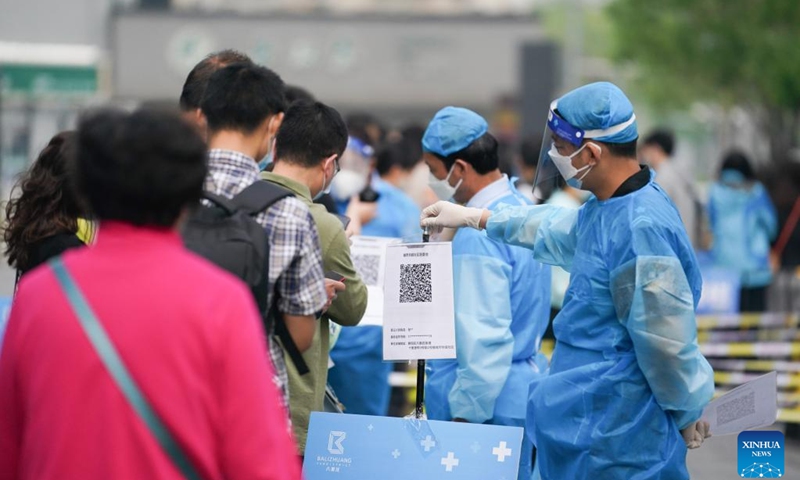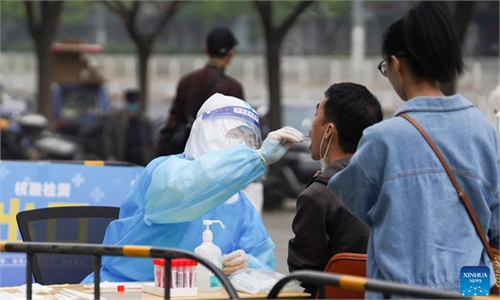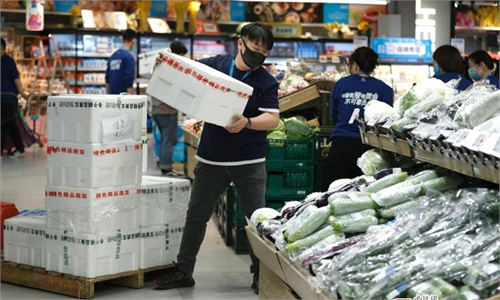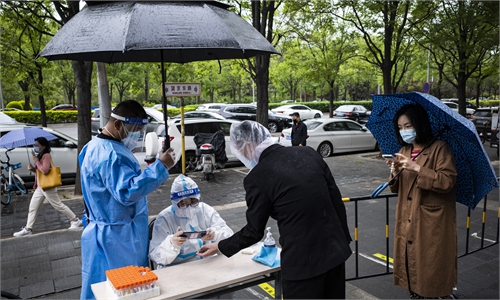
People queue up to register for nucleic acid test at a testing site in Chaoyang District, Beijing, capital of China, April 25, 2022. Starting from Monday, people who live and work in the Chaoyang District have to take nucleic acid test every two days till April 29 to curb the recent resurgence of COVID-19.Photo: Xinhua
The COVID-19 prevention and control authorities of Chaoyang district, Beijing, announced on Thursday that since the establishment of temporary control zones in some areas of Panjiayuan, Jinsong and Shuangjing on Monday, two large-scale nucleic acid testing campaigns were carried out in the areas on Monday and Wednesday and two temporary control zones were added to the list.
There were three confirmed cases found during the round of tests in these areas on Monday, while five tubes of testing samples collected during Wednesday's tests have returned positive nucleic acid results. The results are now being reviewed.
On Wednesday alone, 48 new local confirmed cases and two asymptomatic cases were reported in the whole of Beijing. A total of 142 cases have been reported in 10 districts in Beijing since April 22, including 80 in Chaoyang district.
At present, there are six schools and two kindergartens involved, with a large number of students and high aggregation. Some of the students' activities involved unauthorized off-campus training, which increased the risk of epidemic spread.
As of Thursday, all cinemas in the Dongcheng and Xicheng districts of Beijing had been suspended due to the need for epidemic prevention and control, according to Maoyan and other ticket platforms.
To contain the spread of the epidemic and protect the health and safety of the people, the temporary control zones have been dynamically adjusted based on the judgment of the epidemic control and prevention team.
The two newly added areas cover several residential areas and one of Beijing's largest construction material markets.
Residents in the temporary control area are not allowed to leave the area, and residents in the community will strictly implement prevention and control measures such as scanning codes, temperature measurement and registration, and will not be allowed to leave the community if it is not necessary.
Welfare institutions and elderly service institutions within the temporary control areas shall be closed for management. Restaurants, KTV, chess and card rooms, cafes, entertainment venues, indoor sports and fitness venues, cinemas, libraries, art galleries and museums are suspended.
However, stores, supermarkets, hospitals, and other places that are essential for daily life in the temporary control areas will operate normally, and relevant epidemic prevention regulations such as scanning codes, temperature measurement and wearing masks will be strictly implemented to prevent crowds from gathering.
New rounds of nucleic acid tests will be carried out in the temporary control areas on April 29, May 1, and May 4. During this period, the time and area of temporary control will be dynamically adjusted according to nucleic acid testing and the epidemic prevention and control situation after scientific evaluation.
Global Times



